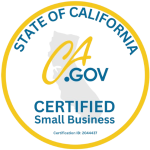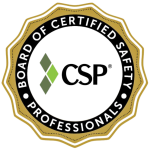SAFETY PROGRAM DEVELOPMENT
Your turnkey solution for EHS planning and program development
The process
Program Development from A - Z
MANAGEMENT LEADERSHIP
Critical - management buy-in
WORKER PARTICIPATION
Most to gain = most to lose
HAZARD IDENTIFICATION & ASSESSMENT
Proactive and ongoing process to identify "root cause" of hazards
HAZARD PREVENTION & CONTROL
Establish Controls to Eliminate or Minimize Hazards
EDUCATION & TRAINING
Methodical dissemination of knowledge to workers
PROGRAM EVALUATION & IMPROVEMENT
A living document
COMMUNICATION AND COORDINATION FOR HOST EMPLOYERS, CONTRACTORS AND STAFFING AGENCIES
1 - MANAGEMENT BUY-IN
- Make worker safety and health a core organizational value.
- Are fully committed to eliminating hazards, protecting workers, and continuously improving workplace safety and health.
- Provide sufficient resources to implement and maintain the safety and health program.
- Visibly demonstrate and communicate their safety and health commitment to workers and others.
- Set an example through their own actions.
2 - WORKER PARTICIPATION
- Are encouraged to participate in the program and feel comfortable providing input and reporting safety or health concerns.
- Have access to information they need to participate effectively in the program.
- Have opportunities to participate in all phases of program design and implementation.
- Do not experience retaliation when they raise safety and health concerns; report injuries, illnesses, and hazards; participate in the program; or exercise safety and health rights.
3 - HAZARD ID & ASSESSMENT
- Collect and review information about the hazards present or likely to be present in the workplace.
- Conduct initial and periodic workplace inspections of the workplace to identify new or recurring hazards.
- Investigate injuries, illnesses, incidents, and close calls/near misses to determine the underlying hazards, their causes, and safety and health program shortcomings.
- Group similar incidents and identify trends in injuries, illnesses, and hazards reported.
- Consider hazards associated with emergency or nonroutine situations.
- Determine the severity and likelihood of incidents that could result for each hazard identified, and use this information to prioritize corrective actions.
4 - HAZARD PREVENTION & CONTROL
- Involve workers, who often have the best understanding of the conditions that create hazards and insights into how they can be controlled.
- Identify and evaluate options for controlling hazards, using a “hierarchy of controls.”
- Use a hazard control plan to guide the selection and implementation of controls, and implement controls according to the plan.
- Develop plans with measures to protect workers during emergencies and nonroutine activities.
- Evaluate the effectiveness of existing controls to determine whether they continue to provide protection, or whether different controls may be more effective. Review new technologies for their potential to be more protective, more reliable, or less costly.
5 - EDUCATION & TRAINING
- Knowledge and skills needed to do their work safely and avoid creating hazards that could place themselves or others at risk.
- Awareness and understanding of workplace hazards and how to identify, report, and control them.
- Specialized training, when their work involves unique hazards.
6 - PROGRAM EVALUATION & IMPROVEMENT
- Establishing, reporting, and tracking goals and targets that indicate whether the program is making progress.
- Evaluating the program initially and periodically thereafter to identify shortcomings and opportunities for improvement.
- Providing ways for workers to participate in program evaluation and improvement.
7 - COMMUNICATION AND COORDINATION FOR HOST EMPLOYERS, CONTRACTORS AND STAFFING AGENCIES
An increasing number of workers are assigned by staffing agencies to work at specific host worksites under the direction and control of the host employer.
Temporary worker safety is enhanced if employers establish mechanisms to coordinate their efforts and communicate hazards and controls effectively before these contract temp. workers come on site.
What now?
Making Sense of it All
We understand that this can feel overwhelming, especially, if you are a new contractor, a company that’s grown into the need or perhaps even a foreign company entering the US or a new state for the first time.
OCEANBOUND CAN HELP YOU BUILD A PROGRAM SPECIFIC TO YOUR NEEDS.
We have expert personnel that can work with your safety or management team to get your where you need to be.
STEPS:
- Need Assessment call/meeting (including current client site specific safety mandates)
- Existing document intake
- In accordance with your EHS policies, your customer/owner policies and Federal OSHA and/or your state’s OSHA plan (if available) we build out a living corporate document and/or a site-specific plan each time.
Additional services
Services >>> Contract Staffing
Not only can we provide you with excellent consultation services for the EHS and QC compliance fields – We can execute the work of implementing the plan on the job for you!
We can provide you with highly experienced and credentialed personnel in a matter of days, not weeks!
services >>> consulting
Just seeking advice for your company or project EHS or QC needs?
Head on over for some more details!
FAQs
How long does this process take?
Depending if you need a:
- Corporate Safety Plan
- Site-specific plan
- Site-specific plan amended from an outdated plan
And how complex you and/or your client’s demands are and any contractual deadlines your are running up against. One to two weeks, sooner if you need an expedited solution.
Ultimately, the “law of the land”, Federal OSHA, states that their standards are the minimum. They also state anyone along the way (State OSHA plans > owner clients > GCs > sub-contractors) can require a more “stringent” set of hazard prevention policies, and to then follow the more stringent policy
SO, if you want the bare minimum guidance from OSHA = faster.
IF, you want to learn what OSHA 1926/10 states and, exceed those with your own standards = slower
Truly depends on your needs. Call us today and maybe we can help you figure it out! 310/871.8740
How expensive is a bespoke program?
We are happy to negotiate a price that works well for you. Let’s chat!
We offer the additional incentive if you staff two or more temporary project professionals (EHS or QC) we will offer a significantly reduced, or possibly inclusive of the staffing rate.
What is the most critical component of developing a successful safety program?
MANAGEMENT BUY-IN, 100%
If the owners or leadership of a high-hazard industry company does not make safety a priority, no one will. Period.
Fortunately, these days unresponsive leadership is going the way of the dodo. The truth is, any contractor operating as a trade partner on any sizable project with significant owner clients and world class prime contractors has no choice – they have to be safe, contractually. This means, literally in the contract terms regarding EHS and also for insurance purposes (EMR rates). The latter effects your worker’s compensation rates, your bonding and ISNetwork ranking which many GCs use to gauge a potential partner’s risk profile.
We can help you build a workable and professional program but it must ultimately be successfully implemented.
If you in between safety managers or need help implementing our plan or your existing plan, at your location or on site, consider staffing one of our highly experienced and certified EHS professionals for a duration of your choosing. You can even take a look at our “TRY BEFORE YOU HIRE” option!

DESERT VOICES – A Listening & Spoken Language Program
Providing Early Intervention and Preschool Services For Children Who Are Deaf or Hard of Hearing.


